
views
Choosing the Right Kind of Milk

Stick with skim milk if you’re trying to control your weight. Skim, 1%, 2%, and whole milk all have the same vitamins and minerals. The main difference is that skim milk has fewer calories and a lower percentage of fat than the other types of milk. Choose skim milk if you’re trying to control your caloric intake or are actively looking to lose weight. The percentages in milk refer to the amount of fat left in the milk after it’s been pasteurized. Whole milk contains roughly 3.5% fat. Skim milk has less than 0.5% fat, and may be marketed as “fat-free.”
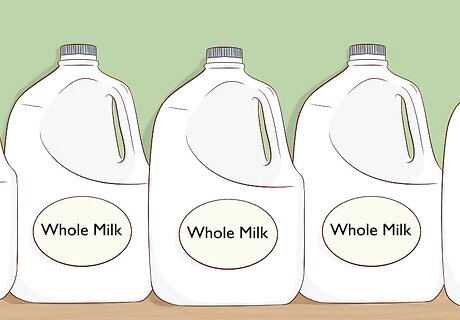
Select 2% or whole milk if you’re trying to bulk up. If you’re actively trying to gain weight or muscle, drinking 2% or whole milk is the way to go. You can use the extra fat and calories to convert the energy into muscle mass while working out. Select 2% if you want to more accurately calculate your daily fat consumption. Choose whole milk if you want the highest amount of fat possible or simply prefer the flavor.
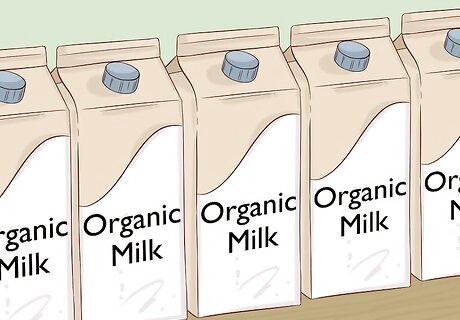
Opt for organic milk if you’re looking for specific acids and vitamins. Organic milk has a higher percentage of omega-3 acids and antioxidants and a lower percentage of omega-6 acids than other forms of milk. These minerals and vitamins have been established to help prevent heart disease and muscle inflammation. Select organic milk if you’ve got a specific set of nutrients that you’re after. Organic milk typically provides a better ratio of fatty acids for your health. Too much omega-6 and too little omega-3 can potentially increase the risk of cardiovascular disease and diabetes. Read the label carefully on a bottle of organic milk to see if it’s “certified organic.” If it isn’t certified, then it hasn’t been checked by the federal government to confirm its contents.
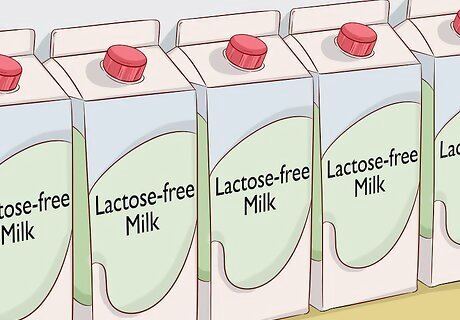
Get a lactose-free milk, like soy or almond, if you’re lactose intolerant. If you’re trying to incorporate milk into your diet but happen to be lactose intolerant, opt for a lactose-free milk. Soy and almond milk are usually fortified to contain a lot of the nutrients and minerals found in traditional milk, so read the label carefully to ensure that a bottle contains the same vitamins and minerals as traditional milk.Tip: Almond and soy milk often have added sugars, so they aren’t strictly healthier options if you’re trying to avoid unwanted additives. You’ll have a lot of choices when it comes to picking a milk substitute since there tends to be a lot more variety from brand to brand.
Drinking Milk to Reach Nutritional Goals

Have 1 glass of milk a day to get enough vitamin A, calcium, and potassium. While there is some debate about the healthiness of consuming milk every day, drinking at least 8 fluid ounces (240 mL) of milk a day can provide you with a number of important nutrients. Milk has a lot of calcium, vitamin A, and potassium, which all aid the body with digestion, keep your bones healthy, and regulate muscles.Tip: While some people believe that milk is an excellent source of protein, it doesn’t actually have a lot of it when compared to the amount of cholesterol and carbohydrates it has. One 8 fl oz (240 mL) glass of milk contains roughly 450 mg of potassium, 35% of your daily value in calcium, and 5% of your daily value in Vitamin A.
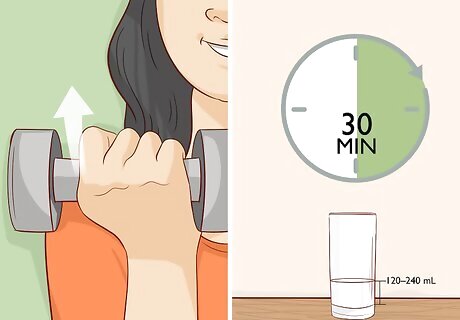
Drink a 4–8 fl oz (120–240 mL) glass after working out to build muscle. Drinking at least 4 fl oz (120 mL) of milk at least 30 minutes after working out can give the body a much-needed boost following some intense physical activity. The protein, carbohydrates, and electrolytes in milk all help your body to recover and build muscle when doing strength training. Milk really isn’t the best option if you’re running or doing endurance training, since your muscles won’t benefit much from the contents in a glass of milk.

Consume 24 fl oz (0.71 L) of skim milk a day while pregnant to stay healthy. If you’re pregnant, consuming milk helps your bones stay strong while helping your unborn child grow. Three 8 fl oz (240 mL) glasses of milk a day will ensure that you get enough calcium, protein, and potassium while your body navigates resources between you and your child. To keep things simple, have 1 glass at breakfast, 1 glass at lunch, and 1 glass at dinner.
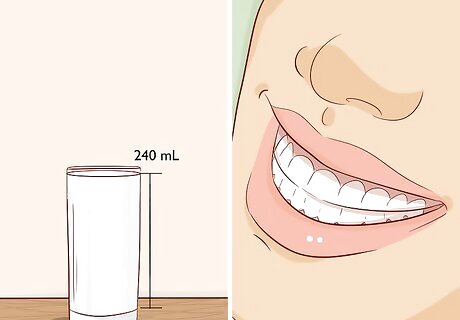
Use milk to strengthen your teeth and regrow your enamel. If you’re trying to regrow your enamel or simply strengthen your teeth, one 8 fl oz (240 mL) glass of milk a day can help you reach your goal. The calcium and minerals in milk will neutralize the acids in your mouth and promote salivation, which is a key component of healthy dental care. Have a glass daily while you’re working on your teeth to keep them strong and healthy. If you get a tooth knocked out, you can actually prevent the cells from dying by putting it in a small glass of milk after rinsing it under water!
Consuming Milk to Help with Medical Issues
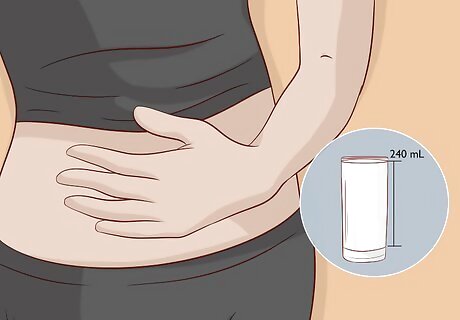
Drink a glass of skim milk to help relieve heartburn. If you have an upset stomach or feel like you may get heartburn, drink an 8 fl oz (240 mL) glass of skim milk. The thick base that milk provides helps coat the lining of your stomach and can provide you with some much-needed relief. For some people, a glass of milk can help settle nausea after consuming too much spicy or salty food.Tip: If you know that you’re prone to getting upset stomachs from spicy food, consider drinking a glass of skim milk ahead of the meal to prevent any unwanted symptoms from setting in. Milk has the same effect in the mouth—if you eat something that sets your mouth on fire or makes it hurt, drinking a little milk can help greatly. Stick to skim milk instead of milk with a higher fat percentage. Milk with a higher fat percentage can sometimes make heartburn or an upset stomach worse.
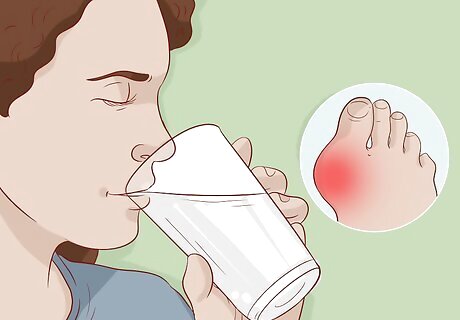
Have a daily glass of milk to reduce your uric acid levels and prevent gout. A daily glass of milk helps reduce your uric acid levels since the proteins in milk help the body digest the uric acid and excrete it as urine. Whether you’re trying to prevent gout or manage a pre-existing case, consuming milk regularly helps reduce the odds that the uric acid in your body crystallizes and causes more problems down the line. In recent years, uric acid has also been linked to other cardiovascular and metabolic problems. Even if you don’t have any of the risk factors for gout, milk can still provide some important health benefits.

Pour a glass of milk in the morning to reduce your blood glucose levels. If you’re pre-diabetic or have increased risk factors for type-2 diabetes, a daily glass of milk can reduce your blood glucose levels. Drink an 8 fl oz (240 mL) glass of milk in the morning to reduce your appetite for sugars come lunchtime and aid in the body’s ability to regulate blood sugar. This results in a reduced glucose level, and drinking a glass every day can help fend off type-2 diabetes. Yogurt and cheese also have a similar effect. If you’re looking for a healthy breakfast and don’t have any milk, some yogurt is a good way to go.




















Comments
0 comment